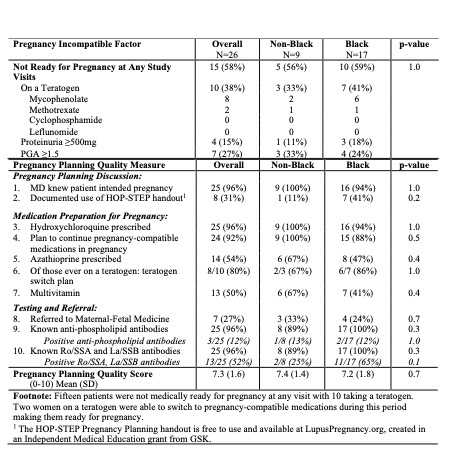Session Information
Date: Tuesday, November 9, 2021
Title: Reproductive Issues in Rheumatic Disorders Poster (1711–1731)
Session Type: Poster Session D
Session Time: 8:30AM-10:30AM
Background/Purpose: The safest pregnancies for women with SLE coincide with periods of disease quiescence maintained by pregnancy-compatible medications. In the US, Black women are more likely to experience unplanned pregnancy and experience higher rates of maternal and infant morbidity, possibly due to inequitable provider-patient planning discussions. The HOP-STEP Pregnancy Planning handout, which is aligned with the ACR Reproductive Health Guidelines, was created to facilitate pregnancy planning discussions between rheumatologists and their SLE patients. We have assessed the systematic ascertainment of pregnancy interest and pregnancy planning discussions in a lupus clinic to identify its impact on pregnancy planning quality and equitable care.
Methods: All women age 18-44 in a prospective registry who met ACR or SLICC criteria for SLE completed an intake form for each visit which included 1) whether she wanted to get pregnant in the next year and 2) contraceptive use. A woman was identified as ‘not medically ready for pregnancy’ if she was on a teratogen, had proteinuria ≥ 500 mg or a physician’s global assessment (PGA) ≥ 1.5. Race was self-reported. We identified 10 Pregnancy-Planning Quality (PPQ) Measures, awarding one-point for each measure. If a woman interested in pregnancy was seen multiple times between 2/2018-12/2019, her score accounted for the accrual of points over subsequent visits.
Results: Pregnancy interest was reported by 26 of 152 (17%) women. Of those interested in pregnancy, the average age was 32.7 years (SD 5.5); 65% identified as Black and 15% as Hispanic. Fifteen patients (58%; 10 Black, 5 non-Black) were not medically ready for pregnancy across visits, with 10 taking a teratogen, 4 with proteinuria, and 7 with a PGA ≥ 1.5. Two women on teratogens were able to switch to pregnancy-compatible medications during this period.
There were no differences in PPQ Scores between Black (7.2) and non-Black (7.4) patients (Table 1). All but one visit included a discussion of pregnancy planning, and the majority of women were given instructions to continue their appropriate medications in pregnancy.
As of 4/2021, 10 women had 12 pregnancies in the follow-up period; 9 (75%) of these were planned and occurred when the patient was medically ready to conceive. One was unplanned and conceived in the midst of a severe cutaneous flare; two were conceived by the same woman when she was taking MMF. Five women had not conceived due to ongoing teratogen use or disease activity. Seven women no longer desired pregnancy due to personal, non-medical reasons.
Conclusion: This study demonstrates that systematic, patient-reported measures of pregnancy interest and proactive pregnancy planning are feasible in an academic specialty clinic. More than half of all women were not medically ready for a safe pregnancy. The risks of poor pregnancy outcomes can be mitigated by addressing plans for pregnancy. Within our study population the majority of pregnancies were planned. The non-pregnant patients cite social issues, medications, and ongoing disease as reasons to not pursue pregnancy. This method shows promise for improving current clinic protocols regarding pregnancy planning.
 Table 1. Cumulative Data Summarizing Factors Contributing to Lack of Medical Readiness for Pregnancy and Assessment of Pregnancy Planning Amongst Women with SLE
Table 1. Cumulative Data Summarizing Factors Contributing to Lack of Medical Readiness for Pregnancy and Assessment of Pregnancy Planning Amongst Women with SLE
To cite this abstract in AMA style:
Sims C, Eudy A, Doss J, Criscione-Schreiber L, Sun K, Sadun R, Rogers J, Clowse M. A Pregnancy Planning Quality Score to Assess a Systematic Intervention to Improve Pregnancy Planning for Women with SLE [abstract]. Arthritis Rheumatol. 2021; 73 (suppl 9). https://acrabstracts.org/abstract/a-pregnancy-planning-quality-score-to-assess-a-systematic-intervention-to-improve-pregnancy-planning-for-women-with-sle/. Accessed .« Back to ACR Convergence 2021
ACR Meeting Abstracts - https://acrabstracts.org/abstract/a-pregnancy-planning-quality-score-to-assess-a-systematic-intervention-to-improve-pregnancy-planning-for-women-with-sle/
